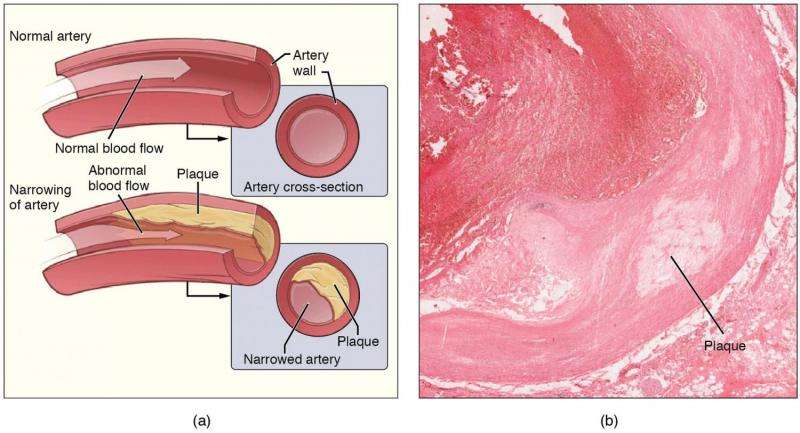How hypertension and aging impact artery walls: New findings on atherosclerosis pathology

New findings show how the progression of atherosclerosis is affected by a combination of hypertension and changes to the stiffness of the artery.
Research published in Science Advances discovers the importance of pressure sensing in combination with sensing of the stiffness, in determining the behavior of vascular smooth muscle cells. The study further identifies the molecular pathways related to the "mechanical sensing" in cells and tissues.
Dr. Thomas Iskratsch from Queen Mary University of London, co-author of the paper, says that "atherosclerosis is a common and severe disease, which amongst others can lead to heart attacks, angina and heart failure. There is currently no effective treatment. Common risk factors are hypertension and aging associated changes to the stiffness of the artery wall."
"To identify potential new strategies for targeting the disease, our study aimed to investigate the combined role of these 'mechanical' stimuli, pressure and stiffness on arterial smooth muscle cells. These cells are residing in the walls of the arteries but are also involved in the progression of atherosclerosis."
The researchers studied how hypertension and changes to the stiffness of the artery wall are both sensed by the vascular smooth muscle cells in the walls of the arteries.
While overall the arterial wall becomes stiffer, they surprisingly found that initial thickening of the artery wall leads to a softer environment on the cellular scale, which together with the higher blood pressure stimulates the smooth muscle cells to change their behavior and switch from a contractile to a "synthetic" phenotype. This enables the cells to degrade and remodel their environment further, leading to further softening and spiraling of the disease progression.
They also found that both pressure and soft environment sensing act through different molecular pathways but were acting on the same effector molecule.
Dr. Iskratsch says that "the interplay of different mechanical pathways was not known and it was surprising that the combination of soft environment and pressure was having this strong impact."
So far, there is a lack of efficient treatments for atherosclerosis. Vascular smooth muscle cells take an important role in the disease progression and especially their phenotypic switching is a critical step. Follow up studies will look at how the findings can be harnessed for therapeutic approaches.
More information: Pamela Swiatlowska et al, Pressure and stiffness sensing together regulate vascular smooth muscle cell phenotype switching, Science Advances (2022). DOI: 10.1126/sciadv.abm3471



















